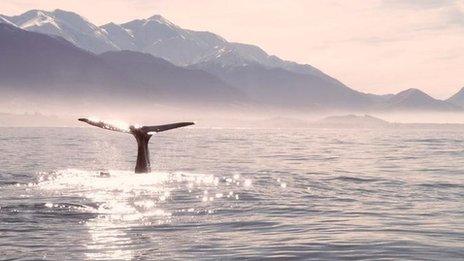Whale sanctuary bid for South Atlantic falls short
- Published

A proposal to declare a whale sanctuary in the South Atlantic Ocean has been defeated at the International Whaling Commission (IWC) annual meeting.
Latin American countries argued that declaring a sanctuary would help whale conservation and whale-watching.
The bid gained more than half of the votes but fell short of the three-quarters majority needed to pass.
Observers noted that the vote was orderly and without rancour, in marked contrast with previous years.
Further votes at the meeting in Panama are anticipated, on issues ranging from subsistence hunting by indigenous peoples to whether the United Nations should be asked to take charge of whale conservation.
Eco-tourism
Marcos Pinta Gama, Brazil's commissioner to the IWC, said he was disappointed by the result, but pleased that the vote had happened.
"We believe that the sanctuary is a very important initiative in order to ensure the protection of whales within the whole South Atlantic, to promote the non-lethal use of cetaceans and and benign research that's important for conserving whales," he told BBC News.
Whale-watching and ecotourism, he said, were becoming important industries for coastal communities.
"In many countries including Brazil, those activities are bringing in financial resources to local communities, it's really expanding, and we think the sanctuary would very much strengthen this kind of activity in the region."
The proposal covered almost the entire Atlantic Ocean south of the Equator, from the west coast of Africa to the east coast of South America.
It would have joined up with the two existing whale sanctuaries approved by the IWC, in the Southern and Indian Oceans.
However, delegations opposing the motion said there was no need for it.
'Symbolic issue'
They pointed out that countries such as Argentina, Uruguay and Brazil can do what they want in their coastal waters where whale-watching takes place, and that there is no whale hunting in the region anyway.
A Japanese statement said that as there is already a global moratorium on commercial whaling, adding a sanctuary here was unnecessary - "building a roof on top of a roof".
And Joanne Massiah, minister of state for Antigua and Barbuda and the Caribbean nation's IWC commissioner, described the sanctuary proposal as "a feel-good, self-serving measure".
Even some delegates voting for the sanctuary said in private that it was principally a symbolic issue.
However, Mr Pinta Gama said the sanctuary would enable better conservation of migratory species that might not be hunted in the South Atlantic but were under threat elsewhere.
With 38 votes in favour and 21 against, the bid failed to pass the three-quarters threshold.
For the rest of the week, most attention will fall on whaling by indigenous groups - mainly in the Arctic, but also in the Caribbean.
Denmark, on behalf of its territory of Greenland, has submitted a bid to increase the number of whales hunted by Inuit people.
But some other nations, including EU members, are concerned by a recent report that found whalemeat on sale to tourists, raising questions over whether the Greenlanders really need quotas as large as those they currently have.
The EU is supposed to maintain a united front in forums such as the IWC, and a joint position is being decided back in Brussels.
Follow Richard on Twitter
- Published2 July 2012
- Published18 May 2012
- Published2 July 2012
- Published23 July 2010